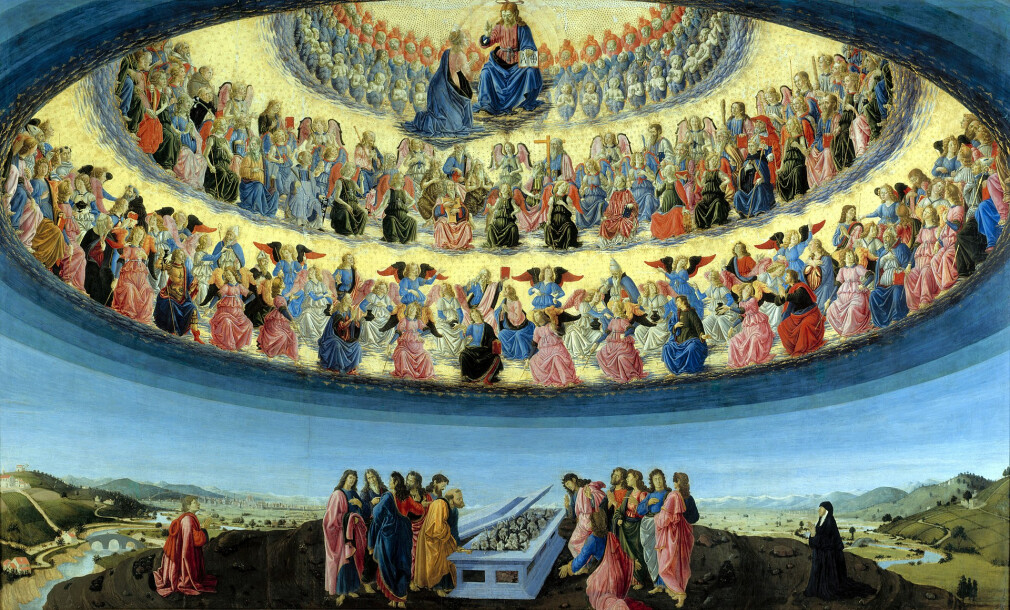All Saints' Sunday: Angels and Demons

It has become that time of year when we celebrate All Saints' Day on a Sunday. (You can search the Book of Common Prayer for the words "All Saints' Sunday", but you won't find them in there!)
The service begins with the familiar hymn for this day: "For all the saints." But I want to draw your attention to the hymn that will conclude the service, Hymn 618: "Ye watchers and ye holy ones."
It's a marvelous hymn that begins with a catalog of angels. Actually, "holy ones" is a reference to the saints, but all the remaining nouns (except for "strain") refer to different classifications of angels. It's like an angel family tree! Wikiepdia has a good overview.
Ye watchers and ye holy ones,
bright seraphs, cherubim, and thrones,
raise the glad strain,
Alleluia!
Cry out, dominions, princedoms, powers,
virtues, archangels, angels' choirs,
I've had some fun in our recent Chorister rehearsals over the last few weeks asking our young singers "what are seraphs? cherubim? thrones?"
The answer, as they've discovered, is always "angels".
The angels are close companions of the saints. We see that in the first line of the first stanza. The second stanza lifts up one saint for special recognition. And in doing so helps place the Saints in the grand scheme of things.
But the words are somewhat coy – always referencing this saint without actually saying who it is. Can you work out who the saint is that we're singing about?
O higher than the cherubim,
more glorious than the seraphim,
lead their praises,
Alleluia!
Thou bearer of the eternal Word,
most gracious, magnify the Lord,
The clues come in the last two lines: "bearer of the eternal Word" refers to the God-bearer, she who bore Jesus in her womb. And the "magnify the Lord" is a clear reference to the Song of Mary, or the Magnificat: "My soul doth magnify the Lord."
So if you said the Blessed Virgin Mary, or Saint Mary as she is sometimes known, you're right!
"Ye watchers and ye holy ones" is not a very old hymn. The author Athelston Riley was one of the compilers of the English Hymnal, and this hymn was first published in that 1906 book.
The staggeringly beautiful descant we will use on the final stanza is by my good friend Noah Horn, the organist and director of music of St. Thomas, New Haven, Conn. It's one that he wrote less than a month ago, and this is the second time we will have used it. We also sang this descant at our Anniversary Festival Eucharist last month.
The song of the saints and angels blend together with our earthly song at the time of the Sanctus (which is something I've written about in this space before). This week the Choir will sing a setting by the famous 16th-century Spanish composer Tomás Luis de Victoria. It's from a Mass setting based on his own Motet "O quam gloriosum," another All Saints' Day piece that the Choir will sing during Communion.
The hymn at communion will be a marvelous arrangement by American organist and composer John Ferguson of the hymn "Shall we gather at the river." We have sung this at St. Peter's every All Saints' Sunday since 2015, and it is quickly becoming a favorite, I believe. In the words of this hymn too, we gather "where bright angel feet have trod."
If the angels and the saints show us the clear path to heaven, they also have the effect of standing in sharp contrast to what is truly demonic in this world. On my mind since last Saturday is the horrible act of violence committed at the Tree of Life synagogue in Pittsburgh. The organ music before the service this Sunday is by the Jewish composer Ernest Bloch, and it is offered with special intention for the victims of violence in that house of prayer.
And this is all about the music for the 10:30 a.m. service Sunday morning. I hope you'll plan to join us at 5:00 p.m. on Sunday as we continue our "Season of Festivity" with a Hymn Festival: "Our Hope for Years to Come".
Keys to the Kingdom is an (almost) weekly blog about the music and liturgy of St. Peter's Episcopal Church, St. Louis, Missouri. It is written by the David Sinden, Organist & Director of Music. You can learn more about the church's music ministry at stpetersepiscopal.org/worship/music or email David at

